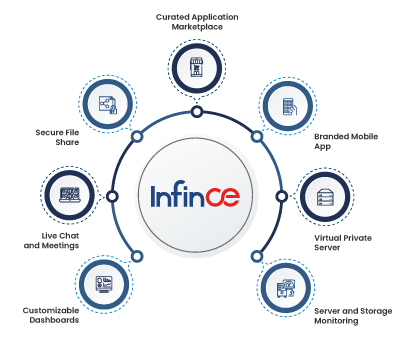How can an integrated cloud platform turn your business competitive?
Across the world, businesses of all sizes are increasingly managing their operations through digital tools such as an integrated cloud platform. The benefits of such a cloud platform extend not just to big businesses but also to the Small and Medium Enterprises (SME) segment where cloud technology has made a significant impact.
The State of Cloud Adoption Amongst SMEs
SMEs are undoubtedly a major contributor to the global economy. While individually, they would not be a significant job creator, the collective market they open up for both jobs and economic contribution cannot be ignored. As competition increases every year and with pandemics like COVID-19 wrecking entire economies in a matter of months, SMEs must stay focused on delivering maximum value from minimal expenditure. As always, turning to digital transformation will be the key element that brings about a competitive edge to SMEs and helps them serve the large digital-savvy customer base worldwide.
No other technology has made business stronger and more profitable for SMBs as the feat achieved by cloud computing. 59% of small businesses that use the cloud have found to be enjoying more productivity benefits than those who are not on the cloud. Additionally, 82% of small business organizations that moved to the cloud reported that they reduced costs considerably with cloud technology.
Now let’s move back to the initial discussion about the benefits of an integrated cloud platform to manage operations, for a small business. Today, there is no shortage of cloud-based business applications that propel SMEs into the same competitive advantage position that bigger companies have with their spending power.
So how can SMEs make the most of a cloud platform to get an edge over their competition? Here are 5 ways:
1. Connected Business Value
An integrated cloud platform for business management provides a medium for businesses to manage their entire ecosystem of digital applications in one place. From functions such as CRM and marketing automation to deal with customers and ERP and HRM to handle internal operations, there is a need to bring a streamlined workflow that connects insights from each department and makes it available for general consumption.
Read more: 5 Reasons Why Every SMB Should Invest In An ERP Solution
A cloud platform-based business management software empowers businesses to achieve this feat at ease. When all stakeholders of a business value chain are brought into a single collaborative platform, it becomes easier to offer better services at a faster pace to customers.
2. Easier Development of New Features
Over time, your business may require newer capabilities in its digital channels to remain competitive. These features and capabilities may be required across different applications or business departments and incorporating them should not be an overly complex endeavor.
With an integrated cloud platform, newer business applications or features could be developed by business users with low code application development mechanisms, facilitated by such platforms. In fact, Gartner estimates that by 2021, nearly 30% of manufacturing organizations will entrust their digital teams to build new features with low code technology. With an integrated business management platform, it becomes easier to maintain a common technology architecture and extensible APIs onto which new features can be easily built and deployed.
Read more: How Workplace Technology and Culture Will Evolve in 2020 & Beyond
3. Reduced Operational Costs
Having disconnected and disparate digital applications in your technology ecosystem can push up operational costs as each system may need access to a different talent pool of specialists for any maintenance or development activity. Having an integrated platform deployed on the cloud will ensure that there is a need only for a single point of contact for all maintenance and development needs. The unified technology architecture makes it easier for newer developers to build features that can be shared across units without the need for development and deployment effort in each individual business system across units. This will greatly improve cost savings in the long run.
Read more: 3 Strong Reasons for Your Business to Embrace Cloud-based IT Services
4. Seamless Organizational Data Management
By leveraging a cloud platform, businesses can enable different sub-functions or departments to work simultaneously on the same digital data from across systems and ensure that all have access to the latest version of files as well. With an integrated system, businesses can save on data re-engineering and re-modeling efforts for interoperability between systems.
Having a centralized business management platform on the cloud also provides a single source of truth as far as key business data is concerned. Management can draw up analytical reports, insights on performance, evaluate metrics of growth, and much more easily from a unified system of applications that cater to multiple business units. Data synchronization and real-time updates allow organizations to maintain the integrity of business data and enable transparency between departments accessing or working on the same data.
5. Easy Cultural Adaptability
When the core business operations are managed and run by software on the cloud, it becomes easier for businesses to respond to cultural changes that may happen abruptly. A striking example is the COVID-19 pandemic which forced hundreds of thousands of businesses to transition into a work from home or remote operations model for employee safety. Those that had a digital core managed by an integrated cloud platform faced no disruption as employees could carry out their daily tasks from the comfort of their homes by securely accessing the organizational cloud system whereas those that did not use such a mechanism found their business to be disrupted for days due to delays in facilitating work from home for all staff.
Read more: How InfinCE Helps You Quickly Transit to Remote Working
How InfinCE Helps
Even before the COVID-19 pandemic shook the world, it was predicted that nearly 78% of all small businesses will fully adopt cloud computing by the end of 2020. By moving to the cloud, they not only realize the benefits of scalability and cost-efficiency but also set the pace for the rapid proliferation of digital transformation. With a powerful integrated cloud platform at the core of operations, enterprises can propel their digital future to new heights. Making the right choice for such a cloud platform is all that matters in this case. If you’re thinking about making the switch to the cloud, then InfinCE can be the answer you were looking for.
With years of expertise in powering the digital backbone of successful businesses worldwide, InfinCE can become the central business management platform of your business handling everything from ERP to Sales and CRM functions. Get in touch with our experts to learn more.





